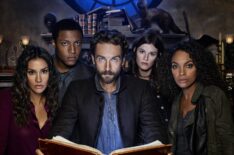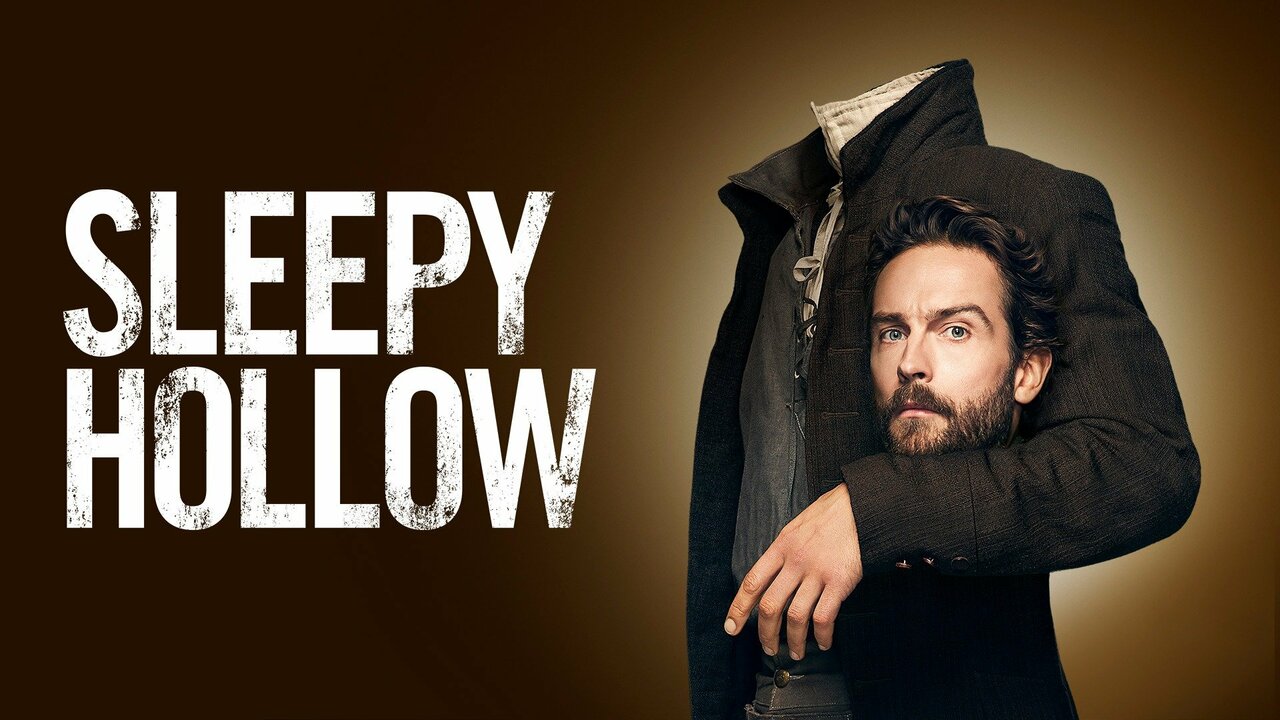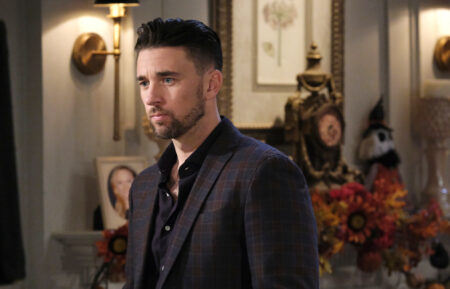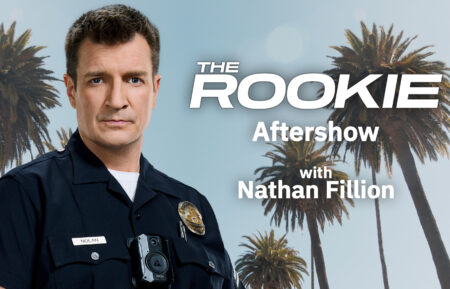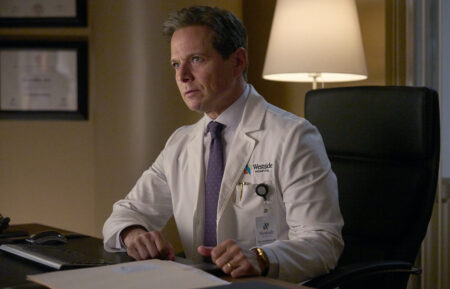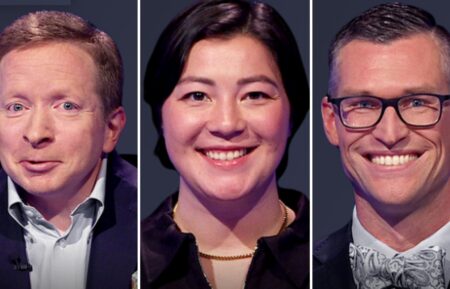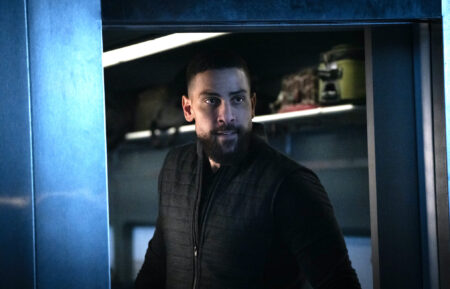‘Sleepy Hollow’ Season 4 Finale: What Did Ichabod Do?
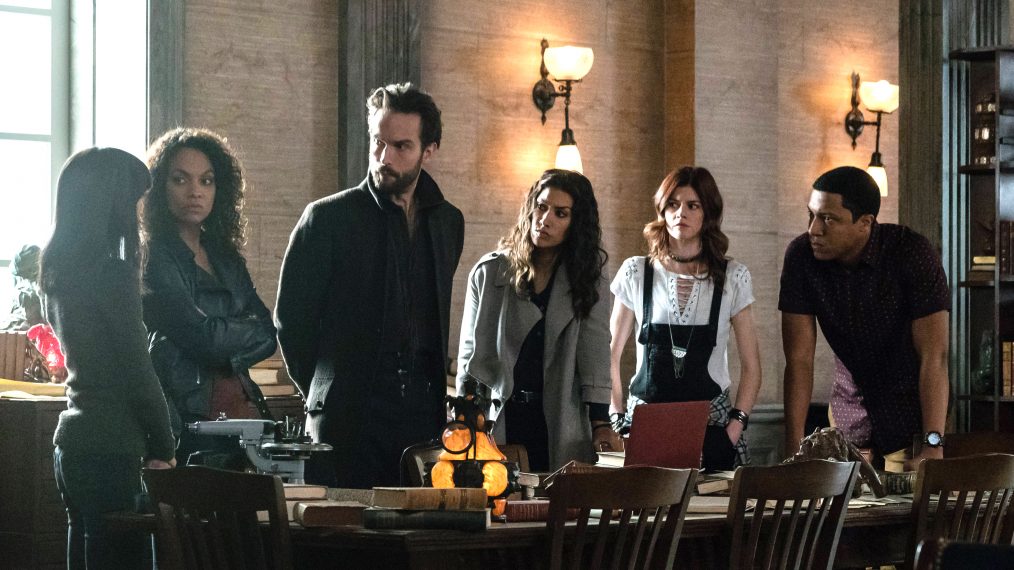
Spoiler Alert
[Warning: This post contains spoilers for the March 31 season finale of Sleepy Hollow, “Freedom.”]
Sleepy Hollow‘s Ichabod Crane (Tom Mison) made a deal with the devil in the Season 4 finale.
With the immortal Dreyfuss (Jeremy Davies) bringing the Horsemen of the Apocalypse into the mix, Crane and Lara (Seychelle Gabriel) traveled to Hell to speak with the devil, who originally struck a deal with Dreyfuss for his soul upon the tech genius’ death. (Dreyfuss bypassed his commitment by becoming immortal.) Ichabod hoped he could convince the devil to assist them in their fight against Dreyfuss, and his pitch was simple: Why should the devil reward his bad behavior?
When Ichabod and Lara returned, they had the tool to render Dreyfuss mortal; the team fought off the Horsemen (including Ichabod convincing War/Henry (John Noble) to let them pass, with Crane convincing his son that he should want to be free) and were able to kill Dreyfuss, who was holding the president hostage.
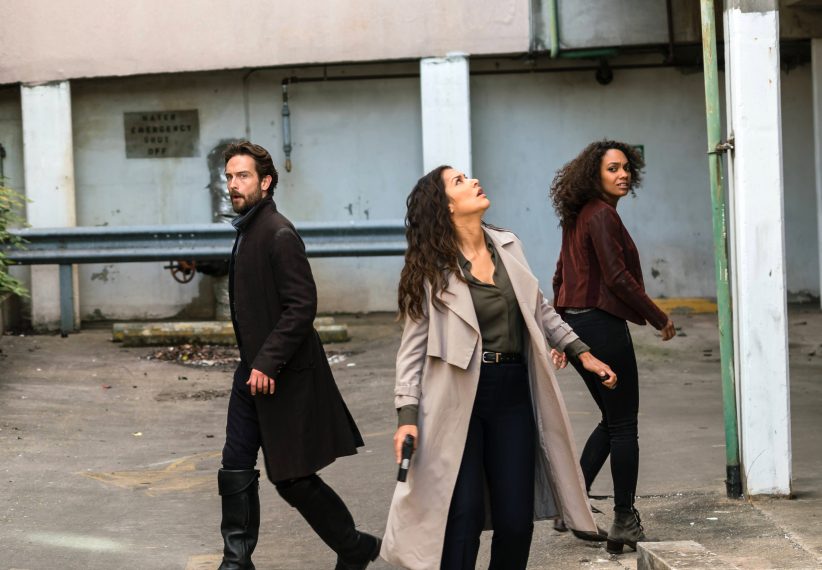
(L-R): Tom Mison, Janina Gavankar and Lyndie Greenwood in Sleepy Hollow
Team Witness was able to celebrate the victory with a few milestones: the team would report directly to the president going forward; and Ichabod was made a citizen of the U.S.
However, Ichabod had his own bit of bad news to share with Diana: in order to get the means to defeat Dreyfuss, he had to bargain away his own soul to the devil.
Sleepy Hollow executive producer (and writer of the hour) Raven Metzner broke down the finale’s biggest twists.
The show was in the position of having to produce a finale without knowing whether it would come back for another season. What were the challenges in crafting this hour, specifically because you had to both wrap things up and leave it open to continue?
I think we wanted to make sure we were able to, in a satisfying way, bring Ichabod Crane to a place where he had reached a landmark goal. We had always talked about Crane becoming an American citizen. And the idea that he would finally find both a family and a larger place for himself in the world.
But at the same time, we wanted to complicate that, and messy it up a little bit, because if we were able to come back, we’d have something to look forward to Crane having to figure out. That’s where the whole idea of the deal he makes, that puts him in jeopardy. And also, in writing that last scene, we had to write a careful line, because we understand that if the series comes back, that’s a real awesome problem. But if it doesn’t, I think we all believe and know as Crane says, he will find a way to figure it out.
How concerned should fans be, especially given Dreyfuss’ confidence in being able to skirt the deal and his ultimate failure?
I know! There’s definitely some real jeopardy. Crane has, over the course of these seasons, done the impossible. His former wife was trapped in purgatory, and he got her out. His partner was trapped in the catacombs and missing, and he found a way to be a part of helping her to escape. As he says earlier in the episode, there are many challenges he’s faced and places he’s gone that were impossible. I think it’s a balance. And with that last monster shot you have there, you wanted to present a challenge we’ve never seen on the show. At the same time, I think you would imagine, somehow, some way, they’ll find a way to stop it, you know?
How did the writers refer to the devil we met in the episode?
We called him a devil or the devil. We’ve gone back and forth on this many times. The mythology of the show has so much of the apocalypse and all of that. He says himself, and it’s one thing [executive producer] Albert Kim really wanted to make sure we got in there, “I’m the devil you know and many you don’t.” On this show, there are many different myriad of demons. Molach was some sort of demonic creature. He’s calling himself the devil, and he’s the devil who made a deal with Malcolm Dreyfuss.
What went into crafting that devil character?
It all goes back to [our use of] “Sympathy for the Devil,” and we had done other versions of it. I was at a cocktail party, and they loved the different versions of “Sympathy,” and he was like, “How are you going to top that? You’ve already had orchestra, you already had a female singer cover it. What’s the next version?” And that stuck in my mind, and at some point in the [writers’] room, I came in, and I said, “The only way to top that is to have him meet the actual devil.” We just thought it would be a fun and interesting new adversary to introduce. If the show comes back, it’s great to know there’s that character that was the voice behind Dreyfuss; he’s a real entity. If not, it’s fun to finally have a moment where he’s face-to-face with the so-called ultimate evil.
The look is something that popped in my head, and you would see him, and at first he would present as a very elegant and interesting gentleman, and then when he turned his face, it would be ruined. Originally, he was going to have maggots crawling on his face. At first, our makeup effects person came up with that beautiful cracked skin, half-face, and then our VFX department augmented it with the blood and flames. Once we saw the blood and flames, we were like, forget the maggots, let’s go for the blood.
Russell Fine directed the episode, who I think just did such an amazing job. Because Malcolm was so corporate, I thought maybe we’d see him in a corporate office. But Russell and I were talking all the way through the process of writing the script, and he was like, “Listen, I think I found Hell.” And I said, “Really?” He said, “Yeah, let me send you a picture.” He sent me this picture of that elevator with the lights and the scene from below, and he goes, “What do you think?” And I was like, “Yep!” [Laughs.]
Jobe (Kamar de los Reyes) betrayed Dreyfuss to help Team Witness. He took Dreyfuss’ soul down to Hell, but is there room for him to come back in the future?
I loved the Jobe character. We talked about a lot in the room—I know the fans really liked him and were eager for more about him. We made a choice to play him a little more mysterious. Every once in a while, we showed a peak into he and Dreyfuss had built a relationship throughout the years. That Dreyfuss had come to really come to rely on Jobe; they would go out to steak dinners.
But, in the end, really, Jobe was given to Dreyfuss. That was the deal that Dreyfuss made in order to become successful was he would have this demon at his beck and call. But when the contract was up, Jobe reverts back to his original owner. We love the actor. Kamar is fantastic and brought so much to the character. He’s definitely still out there. If we came back, I’d love to see the character come back.
What was the genesis of having the team report to the president going forward? And how might that change things if there is a Season 5?
It all comes back to the longer arc for Crane and also Diana. Crane’s legacy, the vault, which we now learn was a combination of Benjamin Banneker’s dream and Washington’s support…his citizenship and finding a place in the world—it’s a neat place to bring him to if it’s the end of the series. If there is a further season, it places him into a leadership role with an interesting group of people he has gathered along the way.
And for Diana, she’s had an interesting arc over the season: to be drawn into this organization because of the death of her partner and to find out her daughter is this Witness, and to be released in this episode of her responsibility, but to come to a place where she is choose to battle against evil in a real official capacity.
I think, also, part of that as well, would be Jenny. I toward the end of the season, Jenny was wrestling with if she would stay or go. But I think, in the end, it would be everyone united—they would be officially under the vault, which they’ve all unofficially been this season.
Henry also opted to stand down. He’s not a good guy, but is there room for him to revisit Sleepy Hollow going forward?
It was interesting: The title of the episode is “Freedom.” The conflict between Henry and Crane is such a deep one, and so based around their distant ideas of who is at fault for Henry’s childhood, which Crane has said many times was not his fault. He was under the ground when it happened. And Henry’s inability to let that go.
Henry has grown over these iterations into this creature of real anger. I think by finally regaining and embodying the armor of War, he believes his role is one of destruction and bringing strife. He really has embraced that. I think the interesting thing there is the question that Crane poses to him; it really goes to Henry’s past mythology in the show: Henry killed Moloch. He didn’t want to have Moloch lording over him. He didn’t want to be anyone’s servant. In Season 2, Episode 17, he wanted to raise this nation of witches where witches would be free. He is a character who would not want to submit to anyone’s tyranny. I think Crane pointing it out to him is the only way Henry would stand down.
I like that moment, too, because there’s so much cool battling in the episode. It begins as a battle of wills and a choice between the two of them and Henry’s anger at the top of the episode. And then it has the resolution between the two of them when Henry, instead of choosing to shoot the gun, metaphorically, instead he stands down.
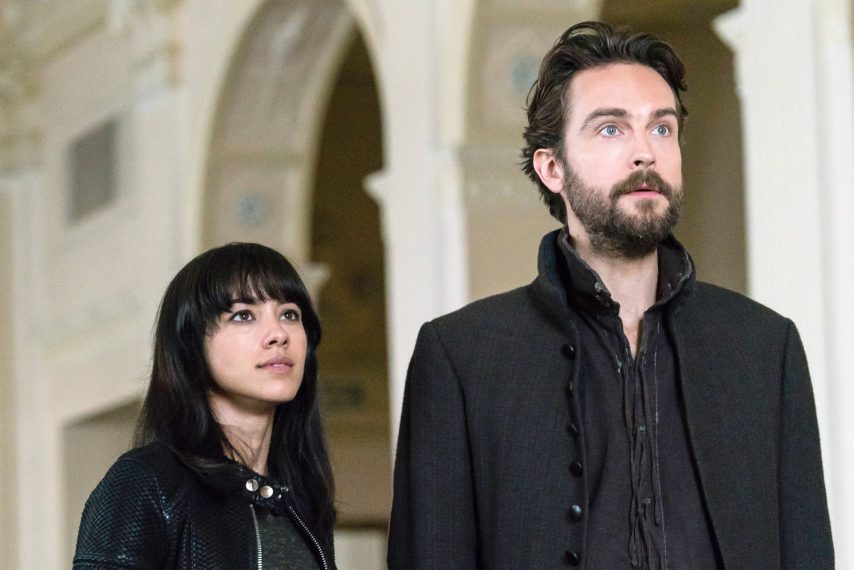
Seychelle Gabriel and Tom Mison in the “Freedom” episode of Sleepy Hollow
Lara, the grownup version of Molly, also opted to leave the team—and Ichabod said goodbye to his fellow Witness with a deep bow. What led to that decision?
We were so happy to have Seychelle join us for these episodes. We adored working with her. So did Tom. We really felt like having her, introducing this idea there’s an evolution of the Molly character, who would be able to literally be a Witness who could fight alongside Crane, and also has a deep emotional bond to both Diana and Molly, is a great character we could use if we came back. If not, it’s nice to know there are these two Witnesses out there in the world who have this connection.
The bow was 100 percent Tom Mison. He is very judicious about the bows that Crane will do. In the moment, on the day, he came up to me and said, “I think in this moment I should bow.” And I said, “Please do, we’d love to see it.” That lovely moment was 100 percent him.
From TV Guide Magazine
Crime, Comedy & Convenience Stores: Unwrapping Hulu's 'Deli Boys' With the Cast
Cupcakes, corndogs…and cocaine?! Two brothers find themselves in a hilarious pickle when they inherit an unseemly bodega biz in Hulu’s new comedy Deli Boys. Find out how The Sopranos and Real Housewives of Orange County influenced the cast. Read the story now on TV Insider.


